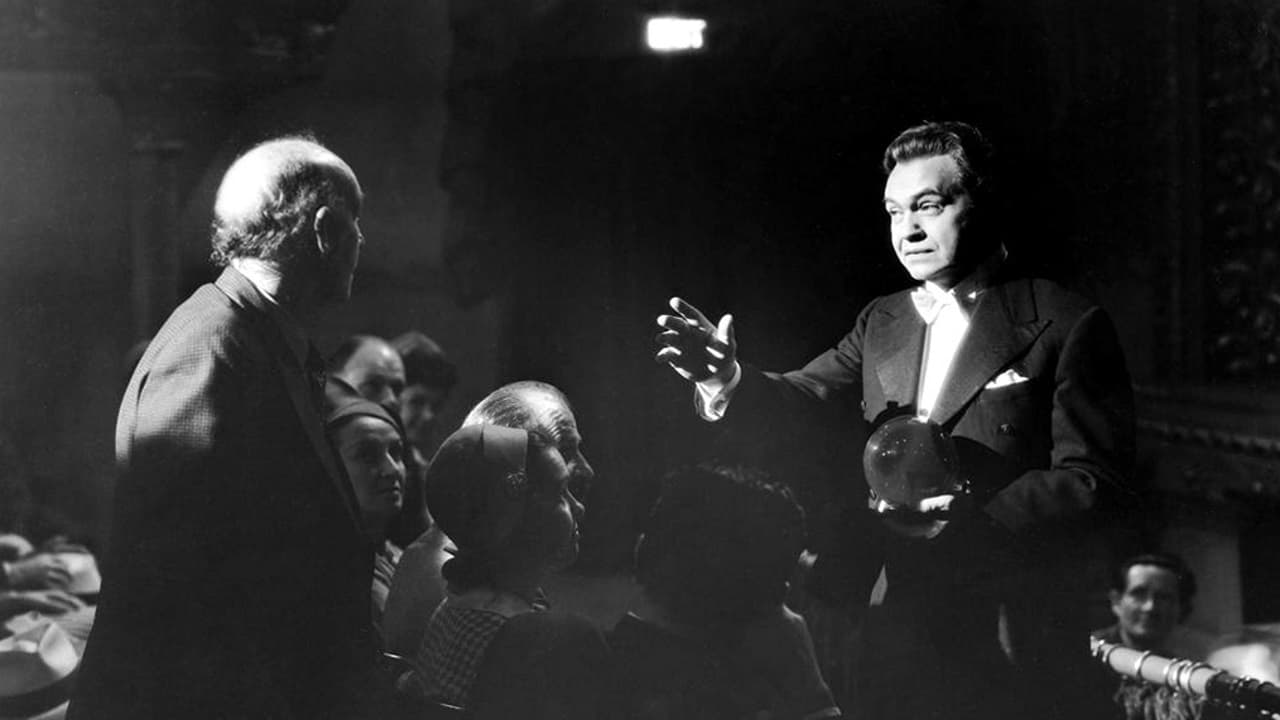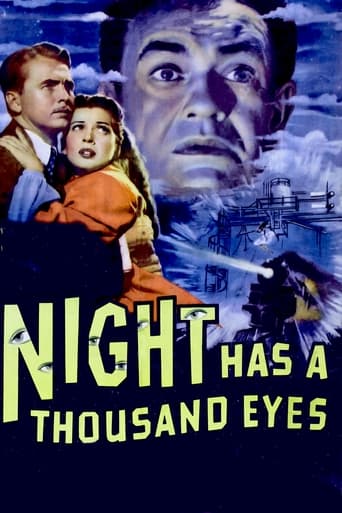NekoHomey
Purely Joyful Movie!
SpecialsTarget
Disturbing yet enthralling
Comwayon
A Disappointing Continuation
Breakinger
A Brilliant Conflict
calvinnme
The first scene is Elliott Carson (John Lund) rescuing his fiancée, Jean Courtland (Gail Russell) from committing suicide - he was told where and how by John Triton. He takes her into a nearby café where John Triton (Edward G. Robinson) is sitting at one of the café tables. Elliot assumes because of Jean's wealth that Triton is part of some kind of con game. Triton then begins his story in flashback. Years before he had a vaudeville act in which he pretended to be one who could see the future. As he says, "it was a phony act, but it was a first-class phony act". Then one night in the middle of a show he has his first real premonition and tells one particular woman that her child is in danger and she must run home. Another time he is talking to a little boy behind the theater and has a premonition that he will be run over by a car. He says something to change the boys plans - he gives him free tickets to the show. The boy says he needs to go tell his mom and, of course, he's run over by a car anyways. Meanwhile his - let us be kind and just call him "less deep and thoughtful" - colleague, Whitney Courtland (Jerome Cowan), is using John's ability to make a fortune in finance.Meanwhile John is haunted by the bad premonitions he is getting about which he can do nothing. The last is the worst though. He sees the future of his love, Jenny (Virginia Bruce). In his premonition the two marry, there is a child, the child lives but Jenny dies. So one night he clears out and decides to become a recluse. If he doesn't talk to anyone he can't see their bad end which he can't seem to change anyways. He knows Whitney will take care of Jenny, and he does. The two marry, have a child, and just as in his premonition, Jenny dies in childbirth. Gail Russell's character, Jean, is the daughter that would have been his, so he does keep track of her over the years. He moves to L.A. just to be in the same town as she and her dad. And then the trouble starts again. First he gets a premonition about Whitney's death when he hears about him trying to break a flight record. Thus he chances meeting Jenny's daughter Jean and warns her about the premonition he has. She tries contacting her dad, but it's too late. His plane has cracked up and Whitney is dead. Then John gets a premonition about Jean's death "under the stars", and we are back to the present, in the café.John wants to retreat back into his little world, but not until he can finally save someone, and not just anyone. He wants to save the daughter that might have been his had things been different. Of course now he has the suspicious fiancé to contend with along with the police whom the fiancé calls who say they found foul play involved in the crack up of Whitney's plane and suspect John as being part of some conspiracy plus they think he could be a little nuts and have the police psychiatrists examining him. Meanwhile Jean is in danger and is being guarded by skeptics. How will this all pan out? Watch and find out.Edward G. Robinson plays the melancholy clairvoyant just brilliantly as you can see how this supposed gift is weighing him down. Like Peter Boyle in the X-Files episode "Clyde Bruckman's Final Repose", a gift is not much of a gift if all it does is give you visions of pain and death you can't seem to change. It is a very gloomy film from the start with the atmosphere of a noir, but not with the kinds of characters and situations normally associated with noir. Highly recommended.
dwandad1
I noticed many of the reviewers saw this film in their early teens. I also saw this movie when I was about twelve years old and I never forgot it. Actually, the film has haunted me since then; I am now almost 55 years old. I researched the internet just to find this movie. I of course did not remember the name of the file, but I remember Edward G. Roberson's performance. Someone wrote the film is not on video. I hope this is not true. I have to find this film. I will write AMC and ask them if they have the video. Good to see so many folks love good performances and recognize EGR's genius. EGR's presence in this film is truly astounding and I cannot get it out of my head. I always have enjoyed his work as most of those in my age group do. I love real gangster films Bogart Edward G ruled back in the day. But what a change and true showing of range to see him play a sensitive moody soul with a talent for which many would kill. His vulnerability and inner turmoil are to state the obvious unforgettable. I must find this film.
Alex da Silva
Triton (Edward G Robinson) has the gift of 2nd sight. He withdraws from life as his ability to foresee the future can be disturbing, especially when he sees people die. This happens on a few occasions but when he meets with his ex-partner's daughter Jean (Gail Russell), we have a countdown to her imminent death before the week is over. The place she will die is "under the stars".This film has a good story and a good cast. Elliott (John Lund) is pretty annoying as a doubter but by the end of the film he has changed his tune. The film starts well with a suicide attempt and we are then taken back in time through flashback sequences to understand the characters before returning to the present as we wait for the death of Jean. There are some omens we are told to look out for - a trampled flower, a gust of wind, a broken vase, lion's feet, some spoken words - and sure enough, they all come true until we arrive at the moment of death - 11pm.William Demarest has some funny lines as "Lt Shawn", the policeman in charge of stopping the tragedy from happening and the story is cleverly tied up. I wasn't too convinced by Gail Russell's ability to negotiate business deals - she seems far too fragile a character to be involved in the hard-edged corporate world. But so what. It's a good film.
dbdumonteil
William Irish aka George Hopley aka Cornell Woolrich (the latter appearing in the cast and credits,his real name) loved the subject so much that not only he wrote a short story but he also wrote a whole novel ,with the same characters .People complained that John Farrow sacrificed psychology to the plot.But it was not Woolrich's forte.His characters elude him,they are puppets ,not in his hands ,but in the hands of fate .This is his most revealing book:he did believe in the power of the stars (one of his short stories,one of his most desperate was called "no moon ,no stars"),he did believe that man's destiny is written before he lives and that he can't change it;the users who know about his miserable life remember that he spent his whole existence in a hotel room;he was gay but the only love he got was from his mother;he ended his life a disabled man ,diabetes leading to gangrene .John Farrow modified the book ,but he remained faithful to Woolrich's spirit;in the novel,it's the father of the girl who has got to die in a lion's jaws .Read it,even if you watched the movie,cause Woolrich's sense of tragedy has no equal in the Roman Noir.Only the ending is a bit embarrassing ,being somewhat contrived and adding a wrong track which weakened the intense emotion :too bad they did not keep the final lines between the girl and her friend.The opening scene on the railroad track can rival with the best films Noirs of the forties/early fifties,like those of Robert Siodmak (who took Woolrich's "phantom lady" to the screen) and Mitchell Leisen (whose "no man of her own" is a thousand times better than the pitiful FRench attempt called "J'Ai Epousé Une Ombre" ).Gail Russel,a relatively obscure actress has wonderful eyes which the director films in the scene in the car as bright as two stars in the night.The-man-who-can-predict-future was a secondary character in the book ,but Edward G.Robinson made it a winner;he added a guilt feeling ,which overwhelmed him and his performance was extraordinary all along the way;this part was tailor -made for him:remember Lang's "woman in the window" ,Duvivier' s "flesh and fantasy" or Siodmak's "the strange affair of Uncle Harry",all tormented characters who have perhaps done nothing and who are feeling guilt.A lot of bizarre details (the cushion,the gun which doesn't shoot,the flower under the shoe,the little boy on the street ,the strange music hall -a scene not unlike the contemporary adventure of Tintin:"Les Sept Boules DE Cristal") create a heavy atmosphere devoid of any providence.

